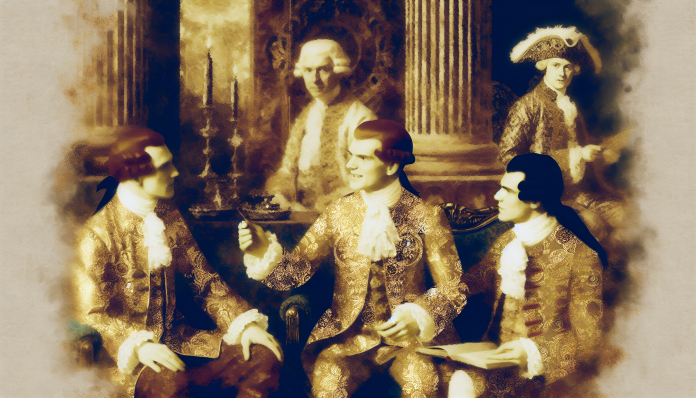Introduction
In the pantheon of 20th-century artists, few figures captivate the imagination like Frida Kahlo. The Mexican painter known for her raw and emotive self-portraits wasn’t just a master of her craft; she was also at the center of one of the most scandalous love triangles in modern art history. Kahlo’s passionate relationship with fellow artist Diego Rivera and her tempestuous affair with the Russian revolutionary Leon Trotsky unveiled the complexities of love, loyalty, and artistic expression against the backdrop of early 20th-century social norms.
Set against a time rife with rigid gender roles and moral expectations, the scandal that enveloped Kahlo and her lovers shook the very foundations of societal norms. Exploring this tumultuous relationship invites us to reflect not only on the artists involved but also on how perceptions of romance, fidelity, and personal freedom have evolved from Kahlo’s time to today.
The Scandal
Kahlo and Rivera: A Love Built on Passion and Pain
Frida Kahlo met Diego Rivera in 1925 when she was just 15 and he was already an established muralist and cultural icon. They married in 1931, a union characterized by both deep affection and heart-wrenching betrayal. Rivera’s numerous extramarital affairs—including one with Kahlo’s own sister—added layers of complexity to their relationship. While their love was tumultuous, it was also deeply creative, as both artists inspired and influenced each other’s work.
The Reckless Affair with Trotsky
The scandal reached new heights in 1937 when Lev Davidovich Bronstein—better known as Leon Trotsky—sought asylum in Mexico after being expelled from the Soviet Union. Kahlo and Rivera had initially extended their hospitality by welcoming Trotsky and his wife into their home. However, what started as an ideological connection quickly morphed into a passionate affair between Kahlo and Trotsky.
Kahlo faced mixed emotions during this time; she was drawn to Trotsky’s revolutionary vigor while still grappling with Rivera’s infidelities. The affair lasted several weeks, and although it was brief, it left an indelible mark on both Kahlo’s art and her personal life.
Public Reactions and Responses
The affair with Trotsky aroused both shock and intrigue among the Mexican artistic elite and the general public. While a certain circle admired the audacity of Kahlo’s passions, others were scandalized by her actions. Diego Rivera’s reaction was more pragmatic than one might expect; rather than condemning Kahlo, he appeared to accept her affair as a testament to their unconventional bond. Rivera famously said, “I don’t know if I should be mad at her for sleeping with Trotsky, or proud that she has the good taste to do so.”
Moral and Cultural Analysis
Societal Reaction in the 1930s
In the context of 1930s Mexico, where conservative values still largely permeated societal attitudes toward marriage and fidelity, Kahlo’s actions could be seen as radical. Gender roles were rigid; women were often expected to embody devotion and sacrifice within their marriages. Kahlo, however, shattered these expectations, embracing her sexual autonomy even as society looked on in judgment.
This scandal was not just a personal affair but emblematic of larger cultural currents, including the rise of feminism and modernist ideas about individualism and relationships. Kahlo and Rivera’s relationship challenged the very fabric of traditional marriage, presenting an alternate model that combined artistic collaboration with emotional turbulence.
Consequences for Kahlo and Rivera
The consequences of this explosive triangle were multi-faceted. For Rivera, it was an accepted part of his persona—a commitment to both love and art over conventional morality. For Kahlo, however, the affair with Trotsky served as both a personal awakening and a point of conflict, influencing her later works that often explore themes of identity, pain, and autonomy.
In the years following the affair, Kahlo continued to paint, and her art began to reflect her tumultuous experiences more candidly. Works like “The Two Fridas” reveal the struggles with her duality and their emotionality informed by her relationships, encapsulating her existential dilemmas.
Modern Perspectives: Shifting Values
If we view this scandal through the lens of contemporary society—characterized by broader acceptance of sexual exploration and diverse relationship models—Kahlo’s affair might evoke different reactions. In a world where casual relationships and open marriages are more prevalent, Kahlo’s actions could be embraced as an assertion of personal freedom.
Critics today often analyze Kahlo’s relationships through a lens of empowerment rather than condemnation. The popularization of terms like “polyamory” signifies a greater acceptance of non-traditional relationships, reshaping how such affairs are viewed. Instead of scandal, Kahlo might be seen as pioneering a path toward liberation from restrictive social constructs.
Conclusion
Frida Kahlo’s love triangle with Diego Rivera and Leon Trotsky reflects not just a narrative of personal betrayal and emotional upheaval but also a broader statement about individual freedom during a period of rigid moral standards. As society has evolved, the willingness to embrace or critique such scandals has shifted dramatically. What was once called scandalous can now be considered nuanced exploration of love, power, and choice.
Ultimately, the story of Kahlo and her lovers urges us to re-examine our own societal norms and attitudes toward relationships. The passions and controversies of her life remind us that behind every artistic masterpiece lies a human story, filled with complexity, heartache, and rebellious spirit. As we delve into these historical narratives, it becomes clear that understanding our past is essential for navigating the intricacies of love and relationships in the present and future.
Through Kahlo’s legacy, we’re encouraged to think critically about our perceptions of love, power, and autonomy—an invitation to forge our paths in a world still grappling with the echoes of history.

